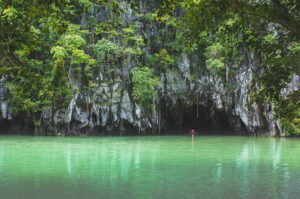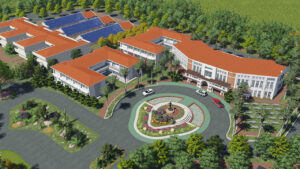Four days in a Palawan paradise

(Part 1)
Thanks to an invitation from the Palawan Business Club to give an economic briefing in an investment road show that they were organizing for Aug. 23, I had the fortune of spending four days in the island paradise that is called Palawan.
I did not mind waking up as early as 2 a.m. on Aug. 22 to take the 4 a.m. PAL flight to Puerto Princesa. It not only ensured that the plane would leave before schedule and arrive at Puerto Princesa 20 minutes before the appointed time, it gave me enough time to travel four hours through very good roads to the town of Rizal so that I could see with my own eyes a coconut corporate farming model called the Lionheart Farms that is getting both national and international attention.
Owned and personally operated by a Danish national by the name of Christian Moeller (who was just appointed Honorary Consul of Denmark), Lionheart Farms is being closely studied by our national leaders (starting with President Marcos Jr. himself) as well as by top business schools all over the world (starting with the Harvard Business School which has published a business case about it).
With the able assistance of Oscar Miguel, an experienced agribusiness executive and rural banker working for the office of the Governor Dennis Socrates of Palawan, I was able to make very good use of the time on Aug. 22, traveling eight hours back and forth, while at the same time getting sufficiently familiarized with the operations of Lionheart Farms from Christian Moeller himself and a very competent management staff of millennials and centennials. It was very gratifying to meet young Filipino professionals, men and women, dedicating their professional lives to the very important industry that is called agribusiness. I always remind the young people of today that agriculture is not just about farming. Better named “agribusiness,” it includes the whole value chain from farming to post-harvest, cold storage, transport and logistics, processing, marketing, sales, and retailing to the ultimate consumers.
During the four-hour ride through a wide and well-paved cemented road one could observe vast fields alternating with rice and coconut, indicating the vast potentials for the island of Palawan to be one of the solutions for food security in the Philippines. Combined with the fact that Palawan is a strong candidate to be the epicenter of Philippine tourism, this island paradise is the perfect model for what the Department of Tourism has termed “agri-tourism,” emulating the success story of Thailand.
Palawan — which to many foreign tourists is identified with the Philippines itself (think of El Nido, Coron, Puerto Princesa, San Vicente, Busuanga, Balabac, among others) — can aspire to be another Bali in the near future for very practical considerations. First, the Philippines has been rated by international tourism organizations as the Best Beach Destination in the world. Second, Palawan has been acknowledged as the “Best Island Resort” in the world. Putting these two realities together, it is not farfetched that for the tens of millions of sand-and-sun enthusiasts of the Indo-Pacific region (the most dynamic and populous economic region in the world today), the Philippines will soon be regarded as the “Spain of Asia.” It is well known that it is primarily the beaches of Costa Brava, Costa del Sol, the Balearic Islands, etc. that attract some 70 million foreign tourists to Spain annually, almost twice the number of Spaniards. It is not farfetched that the Philippines (with Palawan as the core) could be attracting 20 million foreign tourists annually in the next decade or so — as long as we work hard to build the necessary infrastructure to accommodate such a huge number of foreign visitors.
But back to agribusiness. Briefed by Christian Moeller and his very able management staff, Oscar and I saw with our own eyes a corporate coconut farming model that can be replicated in tens of thousands of hectares of coconut farms in Quezon Province, the Bicol region, Samar and Leyte, Negros Oriental and numerous regions in Mindanao. The description of Lionheart Farms in an illustrated coffee table book entitled Palawan Dreams, chronicling the accomplishments of former Governor Jose Alvarez during his nine years as governor of Palawan, is admirably terse: “Lionheart Farms, a private enterprise established in 2016, engages local coconut farmers to produce a range of products from traditional coconut sugar to delicious syrup or nectar and savory coconut amino seasoning of vinegar… Located at the foot of Mt. Mantalingahan Protected Landscape, the enterprise contributes to the attainment of protected area management goals by providing livelihood opportunities to local communities.”
What we saw goes much beyond this very brief description. First, we saw an operation that employs thousands of workers full time as well as part-time through contractual work, a good number of whom are members of the indigenous tribe called Palawan.
We saw a possible corporate farming model that can be replicated not only in the numerous coconut regions all over the Philippines (like Quezon, Samar, Leyte, Bicol, Negros Island, and practically all the regions of the island of Mindanao) but can also be applied to corporate farming of a number of fruit trees in which the Philippines has a competitive advantage, such as avocado, coffee, cacao, mangoes, pili nuts, and durian, emulating what Thailand and Vietnam have already done and, in the case of palm oil, what Malaysia developed in the last century. In fact, Lionheart Farms is the first to attempt to replicate the nucleus estate approach that the Malaysians applied to palm oil with great success. Axelum and Cardinal Agriculture, two other agribusiness enterprises that have succeeded in manufacturing higher value products from coconut, like coconut water, coconut sugar, and coconut milk, are still dependent on small coconut farmers for their supply of their raw materials.
What Lionheart Farms has pioneered in is not in the further processing of the coconut into higher-value products beyond copra and coconut oil, but in the very challenging combination of leasing government-owned lands, cooperatives, and the nucleus estate system (in which small farmers lease their land to a large enterprise like Lionheart Farms) in consolidating more than 3,000 hectares that could be planted to coconuts. In fact, there are other areas of Palawan — like the former Iwahig Penal Colony — in which the Lionheart Farms model can be applied. Palawan could show the way for many other islands in the Philippines on how to reach the necessary economies of scale so that agricultural productivity in the whole country can be significantly increased.
What also impressed me in Rizal town is that corporate coconut farming can go hand in hand with agro-forestry that can contribute much to protecting the environment and that can actually enhance the profitability of corporate farming through the attainment of carbon credits.
Palawan can really aspire to be a major island for agri-tourism if it can be the very first island to introduce into agriculture the four strategies for attaining high productivity in agriculture.
We have already seen what farm consolidation is all about as applied to thousands of hectares in Rizal, Palawan by Lionheart Farms.
The second requirement is product diversification. The southern part of Palawan is replete with rice and coconut farms. But in the future, from what I saw at Lionheart Farms, other trees and vegetables can be planted between the coconut trees, such as cacao, coffee, papaya, and many high-value vegetables. Instead of having been obsessed with rice self-sufficiency, the Philippines should have diversified into many more exportable products beyond bananas and pineapples. For example, it is admirable how Vietnam, in a very short time, thanks to enlightened policies of the Vietnamese government, has become the second largest exporter of coffee in the world.
To complete the image of Lionheart Farms being a microcosm of what can happen to Philippine agriculture in the next decade or so — given the appropriate support from the Government and more agribusiness entrepreneurship from the private sector — let me also cite the way the management of Lionheart is introducing digitalization into the whole value chain, from growing and planting the seedlings, fertilizing the trees, harvesting the flowers from which the syrup is extracted, processing the raw material into the finished products for the beverage and condiment industry, and marketing the products. There is a lot of data analytics that is already being done from farm to factory.
But most important of all is the highest priority given to human resource development by top management. A Lionheart Academy has been established to constantly upskill, reskill, and retool both the workforce and the management.
If farm consolidation, product diversification, digitalization, and industrialization — as being applied now at the Lionheart Farms— can be applied to numerous other agribusiness enterprises in this paradise made up of 1,200 islands, the vision of Palawan being the epicenter of agri-tourism in the Philippines can be attained in the next decade or so.
(To be continued.)
Bernardo M. Villegas has a Ph.D. in Economics from Harvard, is professor emeritus at the University of Asia and the Pacific, and a visiting professor at the IESE Business School in Barcelona, Spain. He was a member of the 1986 Constitutional Commission.




